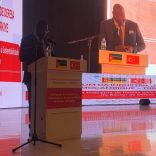Mozambique: Government and CTA advocate defence industry investment – Watch
Mozambique falls on democracy index, gets classified as ‘authoritarian’

in file CoM
Mozambique’s position on the Democracy Index drawn up annually by The Economist deteriorated in 2018 and is now classified as an “authoritarian regime” in an assessment in which most Portuguese-speaking countries maintained their scores.
Mozambique, which in 2017 ranked 115th of 167 countries and was considered a “hybrid regime”, fell in 2018 to 116th place and was classified as an “authoritarian regime”.
The country obtained a global score of 3.85 in 10 possible points, compared to the 4.02 points achieved in the previous evaluation.
Political participation (5.00 points) and political culture (5.00) were the best evaluated criteria, while the worst score was attributed to government functioning (2.14) and civil liberties (2.53).
The change in Mozambique’s classification was prompted by the “disputed October local elections, which risk destabilising the ongoing peace process between the ruling Frelimo and the armed opposition party, Renamo,” according to The Economist.
In an index that does not include São Tomé and Príncipe, Cape Verde remains the best-placed Lusophone country, ranking 26th ahead of Portugal (27th), East Timor (42nd) and Brazil (50th), all classified as “flawed democracies”.
Despite having maintained the same score of the previous index (7.88), Cape Verde dropped three places in the list compared to the previous evaluation that placed it in 23rd place.
The country had the best scores in electoral process and pluralism (9.17), civil liberties (8.82) and functioning of government (7.86) and the worst in political participation (6.67) and political culture (6.88).
Timor-Leste kept the score at 7.19, but rose one place in the index, while Brazil improved the rating, going from 6.86 to 6.97, but fell one position.
“Electoral process and pluralism” and “civil liberties” were the best evaluated categories in the two countries.
Angola (123rd), Guinea-Bissau (157th) and Equatorial Guinea (161st) maintain the classification of “authoritarian regimes”, with slight fluctuations in both scores and index position.
Angola maintained its score of 3.62 compared to the previous assessment, but moved from 125th to 123rd, while Guinea-Bissau (157th) and Equatorial Guinea (161st) maintained their positions, although Equatorial Guinea improved its score from 1.81 to 1.92 points.
Guinea-Bissau scored a 0.00 on the criterion of “government functioning” while Equatorial Guinea had the same value in the “electoral process and pluralism” requirement.
Published annually, the Democracy Index of The Economist Intelligence Unit assesses country performance on five key indicators – electoral process and pluralism, government functioning, political participation, political culture and civil liberties.
This year’s issue is “Democracy Index 2018. Me too? Political Participation, Protest and Democracy” and is led by Norway (9.87 points), which tops the list of only 20 countries classified as “full democracies”.
As “flawed democracies”, which includes Portugal, 55 countries were classified, 39 as hybrid regimes” and 53 as authoritarian regimes.












Leave a Reply
Be the First to Comment!
You must be logged in to post a comment.
You must be logged in to post a comment.